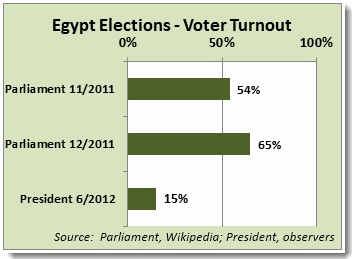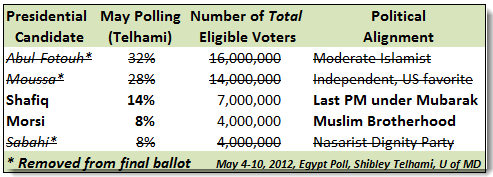One goal of Egypt's 2010 union inspired Tahrir Square protests was fulfilled during the December, 2011 parliamentary elections. Nearly 65% of the nation's fifty million eligible voters turned out to vote. Turnout for the June 16 and 17, 2012 presidential election dropped to an estimated 15%* according to local and press observers. What happened?
Three factors contributed to the exponential decline in voting. Egypt's courts took leading candidates off of the final presidential ballot. The disappeared candidates had the support of 68% of the electorate according to a major preelection poll in early May. Egyptian courts also disqualified one third of the recently elected parliament. Just a day before the election, military commander Mohamed Hussein Tantawi announced that the constitution had been annexed. This was a nice way of saying that the military was assuming most of the powers of the presidency, leaving the newly elected chief executive with little to do.
The entire foundation of the election vanished in plain sight. There was no point in voting. The preelection actions by the courts and military represented the most fundamental form of election fraud by making the elections meaningless.
Why vote?
The vast majority of eligible voters either abstained or went to the polls as part of the Mobteloon movement to deliberately deface and void ballots. The Egyptian revolution has moved from massive public protests leading to the end of the Mubarak regime to a fixed presidential election orchestrated by the armed forces and courts.
Roots of the Revolution
The January 2010 protests at Tahrir Square captured the attention of Egypt, the Middle East, and the world. Key demands included an end to the presidency of Hosni Mubarak, a transition to democratic rule, and recognition of independent trade unions. The core faction of the protests and leadership of the peaceful revolution came from unofficial Egyptian unions. This cadre was ignored by the press in the United States and Europe. Nevertheless, the group exists and has been there for more than a decade working for higher wages and dignity in the workplace. The outlawed unions helped achieve a key goal, the removal of Mubarak, and opened a window for change in the nation of over 100 million.
The Next Hurdle
As the 2011 parliamentary elections progressed, it was apparent that the front line of the revolution, the independent unions, would be underrepresented in elections for parliament and the presidency. The simple truth is that parties representing elements of the old regime and the Moslem Brotherhood had a huge head start based on existing organizations and structure. But this advantage failed to materialize.
The nationwide poll from mid-May (above) showed that a moderate Islamist, Abdel --Men'em Abul --Fotouh, was leading with a 32% preference. Abul-Fotouh had resigned from the Muslim Brotherhood prior to entering the race. Independent Amr Moussa was a close second at 28%. Hamdeen Sabahi of the Nassarist Dignity Party was at 8% in the poll.
The established powers had to do something. Their candidates, Shafiq and Morsi, were doing poorly with a combined 14% .
At the last minute, the courts removed three candidates from the final ballot. Only Shafiq and Morsi remained on the ballot after the military and courts made their move.
I seemed that the manipulation by the military and courts had saved the day for the prevailing powers. The winner would either be a former Mubarak Prime Minister or an official of the Muslim Brotherhood, a party known to cooperate with governments is supposedly opposed.
But when the election was over, the two remaining candidates got only seven million votes, a 15% turnout. Compared to the 65% turnout in December, 2011, Egyptian voters made a clear statement to the world that Egyptians had no respect for the election. They voted by not voting.
The Last Shall be First
(Note: You can view every article as one long page if you sign up as an Advocate Member, or higher).






